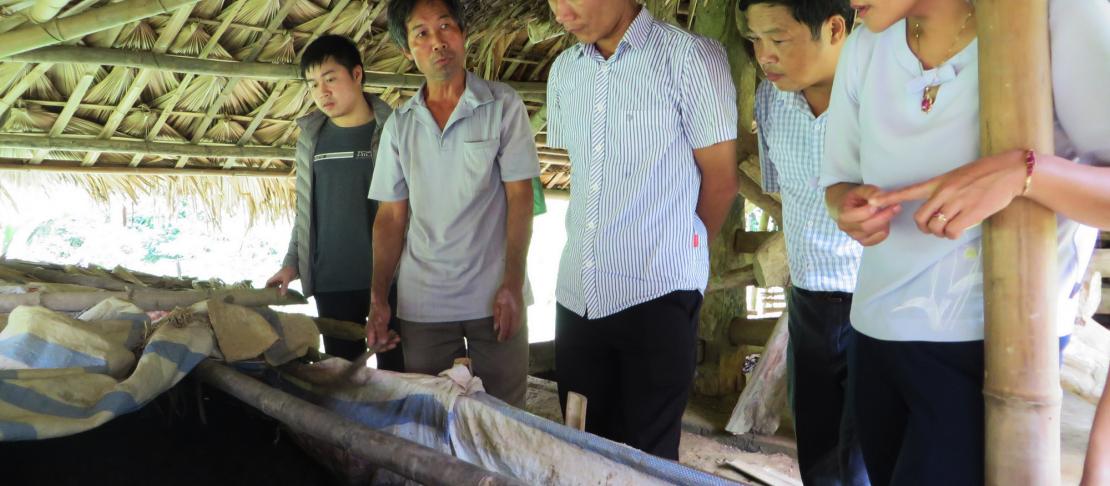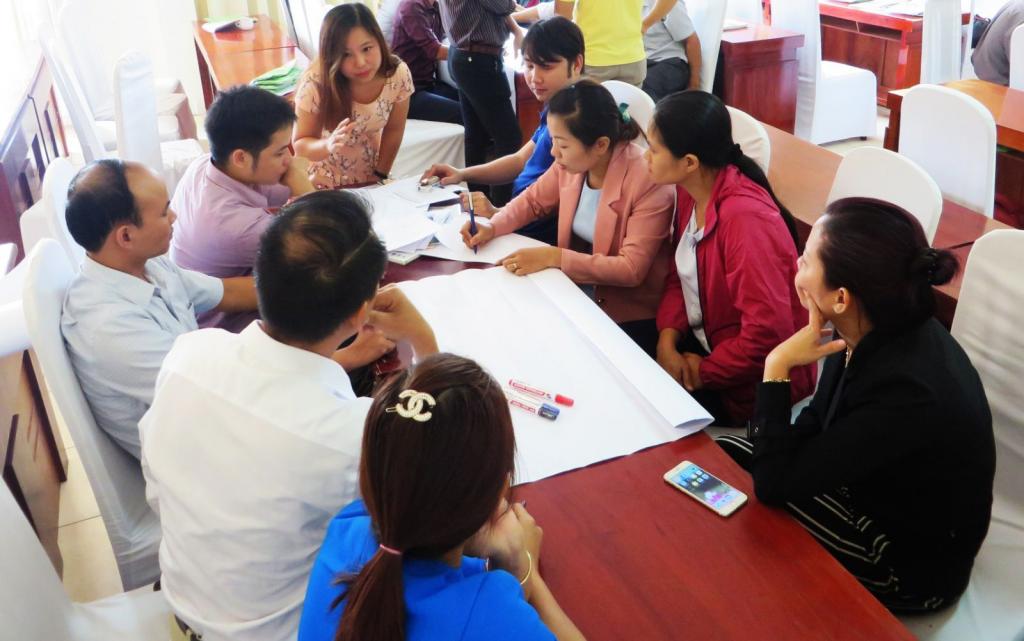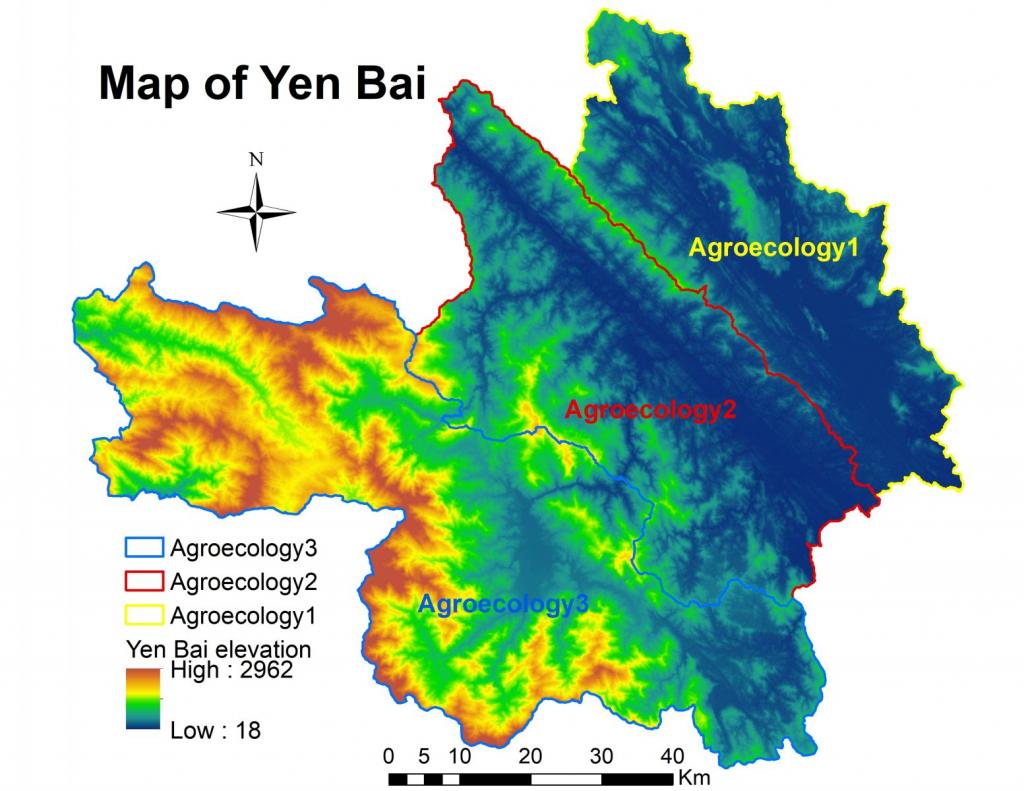Harnessing the role of extension workers in climate-smart agriculture outscaling

By tapping extension workers’ technical knowledge and practical experience in the field, outscaling climate-smart agriculture technologies and practices will be more appropriate and effective.
Evidences of success in climate-smart agriculture technologies and practices (CSA T&P) adoption and expansion in Climate-Smart Villages (CSVs) have been promoted frequently to local communities by the CGIAR Research Program on Climate Change, Agriculture and Food Security in Southeast Asia (CCAFS SEA). To strengthen capacity of local extension officers in integrating CSA T&Ps in agricultural development plans and strategies, a training course on CSA knowledge sharing and CSA outscaling was conducted in Yen Bai province, Vietnam.
Thirty-two participants composed of extension leaders and extension officers from seven districts and towns attended the training. During the training, Yen Bai extension leaders and officers discussed climate risks and their impacts on agriculture and livelihoods of the province; learned about success of CCAFS projects in CSVs; visited CSA practices implemented by farmers in Ma CSV; and identified strategies on how to scale out the CSA works widely in the province.
 The workshop participants were grouped according to three major agro-ecological areas to identify the climate risks and possible adaptive solutions. Photo: Yen Tan Bui (IRRI-CCAFS SEA)
The workshop participants were grouped according to three major agro-ecological areas to identify the climate risks and possible adaptive solutions. Photo: Yen Tan Bui (IRRI-CCAFS SEA)
Workshop and field visit
The participants were given lectures on climate change impacts to agricultural production and adaptation strategies. CCAFS researchers also facilitated discussions on community-based approach for CSA outscaling based on CSA T&Ps prioritized and implemented in the Ma CSV. The lessons on community-based CSA prioritization learned from other CSVs were also shared with the participants.
Participants also had opportunities to interact with project team and villagers when they visited demonstration sites in Ma CSV, such as the integrated home gardens, waste management, and advanced livestock production.
Being experienced extension officers, the participants gave very useful comments and technical suggestions to Ma farmers on how to further improve the various CSA T&Ps. Ms. Do Thi Van, vice director of Yen Bai Extension Center, emphasized that they can use Ma village as a learning site for CSA extension and CSA T&Ps here can be expanded to the whole Yen Bai province. Ma farmers also expressed their willingness to contribute to the expansion of CSA T&Ps process as experienced CSA implementers.
Integration of climate change issues and CSA interventions into the provincial extension implementation plans were also tackled during the training. Group discussions focused on the integration of CSA T&Ps into district extension plans, and identification of the technical assistance needed.
 For the discussion on CSA outscaling, Yen Bai were divided into three major agro-ecological areas based on their distinctive socio-economic and biophysical characteristics. Image: Dr. Vinh Le Bui (CIAT)
For the discussion on CSA outscaling, Yen Bai were divided into three major agro-ecological areas based on their distinctive socio-economic and biophysical characteristics. Image: Dr. Vinh Le Bui (CIAT)
Climate-smart agriculture alignment and outscaling
The participants identified distinctive socio-economic and biophysical characteristics of three major agro-ecological areas that drive CSA outscaling plans in Yen Bai province. For each agro-ecological area, the typical climate risks, their impacts to agricultural production, and the possible adaptive solutions were discussed actively by the participants.
For instance, drought impacts in Yen Binh and Luc Yen districts can be reduced by using drought-tolerant varieties and applying mulching and intercropping (cover crops) practices. The negative effects of cold spells in Tran Yen and Van Yen districts can be prevented by using cold-tolerant varieties, cut-and-carry forage system, and feed reservation for livestock. Similarly, strengthening dike systems and practicing integrated farming are measures that can be done in Van Chan and Nghia Lo districts to prevent landslides and harvest loss caused by flash floods.
At the end of the training, facilitators and participants discussed future collaboration between CGIAR research programs and the Yen Bai extension centre, as well as the Yen Bai Department of Agriculture and Rural Development (DARD). Mr. Vu Van Cuong, the leader of Yen Binh extension station, shared that “contents of the training match with what we expected, and help us to answer questions about climate-related problems in our area.”
The next training for the extension workers is planned to be held in 2018. CCAFS SEA will continue working with Yen Bai DARD and provide technical support to promote CSA out-scaling in the province.
Read more:
- CCAFS blog: Developing climate-smart farmers using knowledge-sharing and on-site learning approaches
- CCAFS blog: Participatory land-use planning in Ma Village spurs better farming decisions
- CCAFS blog: Farmers in Ma Village to lead in outscaling climate-smart agriculture
Eisen Bernardo is the Senior Communication Specialist of CCAFS Southeast Asia.



